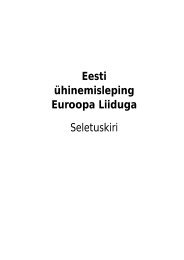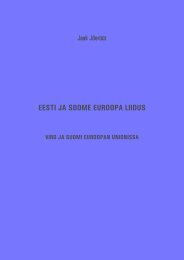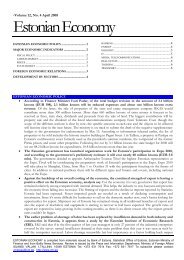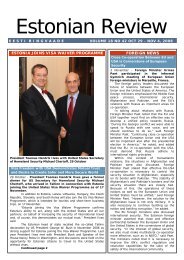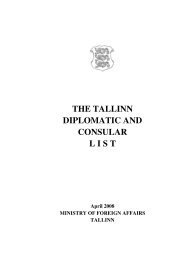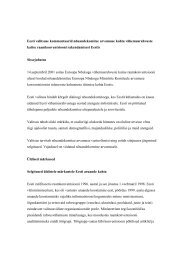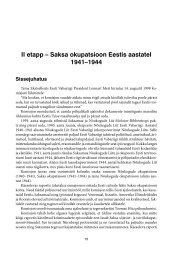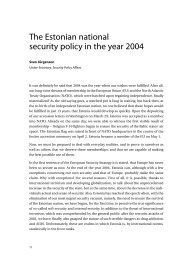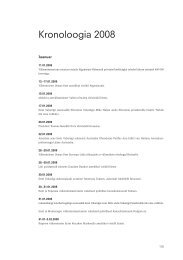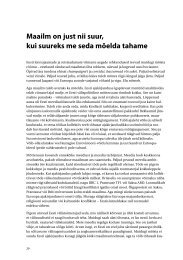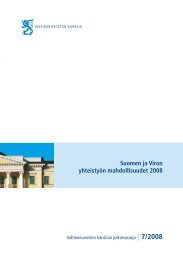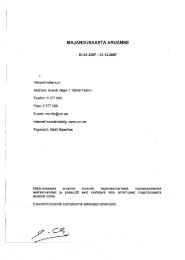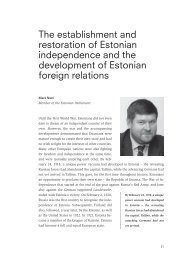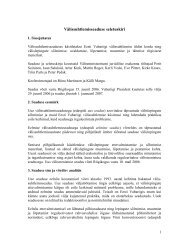Opportunities for Cooperation between Estonia and ... - Valitsus
Opportunities for Cooperation between Estonia and ... - Valitsus
Opportunities for Cooperation between Estonia and ... - Valitsus
Create successful ePaper yourself
Turn your PDF publications into a flip-book with our unique Google optimized e-Paper software.
APPENDIX 3<br />
EDUCATION<br />
Globalization moulds the expectations that society, culture, business <strong>and</strong><br />
industry have as to the significance <strong>and</strong> content of education. Although the<br />
mission of education is always to raise the level of general knowledge, it is also<br />
important to focus on the areas with direct links to future development in the<br />
economy <strong>and</strong> society. When the priorities are selected, due consideration must<br />
be given to the changes taking place in the research <strong>and</strong> business environments.<br />
An on-going public debate is important to underst<strong>and</strong> these changes.<br />
The resources available to higher education are scant in <strong>Estonia</strong> <strong>and</strong> Finl<strong>and</strong>. To<br />
improve competitiveness, they need to be exp<strong>and</strong>ed. At the same time, serious<br />
consideration should be given to the possibility of pooling the resources of<br />
the two countries if found to be efficient <strong>and</strong> appropriate. It would also mean<br />
specialization by field of study. It is not advisable to try <strong>and</strong> achieve the highest<br />
level of per<strong>for</strong>mance in all scientific work if better resources <strong>and</strong> conditions in<br />
the same field are available across the Gulf of Finl<strong>and</strong>. The Finnish <strong>and</strong> <strong>Estonia</strong>n<br />
ministries of education should create flexible procedures <strong>for</strong> harmonizing the<br />
national goals <strong>for</strong> education.<br />
The objective should be to create an efficient field of study <strong>and</strong> research in which<br />
<strong>Estonia</strong> <strong>and</strong> Finl<strong>and</strong> would have a shared interest. Aside from specialization<br />
<strong>and</strong> division of duties, the system would also promote the free mobility of<br />
students <strong>and</strong> researchers. Such a common area of study <strong>and</strong> research calls <strong>for</strong><br />
coordinated investments <strong>and</strong> efficient networking.<br />
During 2006–2007, a total of 664 <strong>Estonia</strong>ns were pursuing university-level<br />
studies in Finl<strong>and</strong> <strong>and</strong> 437 Finnish students in <strong>Estonia</strong>. The EU’s Erasmus<br />
Programme is a key tool in the exchange of students across the Gulf of Finl<strong>and</strong>.<br />
From the beginning of 2008, all the Baltic countries can participate in an<br />
equivalent Nordic programme called Nordplus.<br />
The Bologna Process has harmonized the academic degree st<strong>and</strong>ards. While<br />
favourable conditions <strong>for</strong> the exchange of students <strong>and</strong> teachers across the<br />
Gulf of Finl<strong>and</strong> have been created, a number of practical problems have also<br />
been encountered that need to be addressed.<br />
To some extent, teaching programmes have already been harmonized to allow<br />
students to earn credits in both countries. Inter-government ef<strong>for</strong>ts should<br />
be continued in degree planning – even some <strong>for</strong>m of joint degrees could be<br />
28



